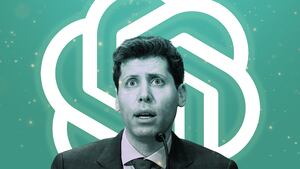OpenAI announced a slew of updates and additions to its growing arsenal of artificial intelligence products today—including a platform that allows users to create their own customized version of ChatGPT.
Company CEO Sam Altman took the stage on Monday at DevDay, the company’s first-ever developer conference, to make the announcements. Among the products is a more powerful version of GPT-4 and even a program called Copyright Shield that will ensure legal protection for users who could get sued for copyright infringement.
The customizable chatbot product, dubbed GPTs, allows users to create custom versions of ChatGPT and tailor them for specific uses, like creative writing, career mentoring, cooking, tech advising, or even helping out with the laundry—with zero coding knowledge required. OpenAI will also be launching a store for users to sell GPTs that they’ve created to others.
“You can build GPTs, a customized version of ChatGPT, for almost anything,” Altman said in his keynote address. “With instructions, expanded knowledge, and actions—and then you can publish it for others to use.”

OpenAI CEO Sam Altman speaks during the OpenAI DevDay event on November 06, 2023 in San Francisco, California. Altman delivered the keynote address at the first-ever Open AI DevDay conference.
Justin Sullivan/Getty ImagesThe GPTs are also capable of connecting with third-party apps like Zapier and Canva, along with OpenAI’s existing products such as DALL-E and its coding tool. There are additional plans to expand those capabilities to even more third-party apps like email and digital calendars.
The product seems to be the company’s answer to competitors such as Meta who have recently announced their own suite of chatbot personas, including ones inspired by pop culture icons like Snoop Dogg, Mr. Beast, Tom Brady, and Paris Hilton. However, OpenAI’s chatbots are much more focused on utility rather than emulating a flesh-and-blood person.
The choice likely serves two purposes for OpenAI. For one, it’s simple market positioning to separate itself from its competitors. However, it also addresses a big concern that AI ethics experts have when it comes to users personifying these models.
After all, chatbots have been shown to be shockingly persuasive even if they don’t necessarily have a personality. This can lead to a whole host of issues ranging from the bots spreading misinformation, to bots causing some people to fall in love with them, to even one instance in which a bot convinced a man to kill himself.
By making it as clear as possible that their AI products are intended to be used as tools rather than a companion or partner, it reduces that risk—at least by a little bit. That’s not to say that people won’t be able to find workaround solutions, which seems likely given the amount of customization available to the chatbots.
Along with GPTs, the company also announced GPT-4 Turbo, which Altman said has been trained using data up to April 2023—making it their most up-to-date chatbot yet. The model will include a 128K context window, which means that it’ll be able to take in “more than 300 pages of text in a single prompt,” according to a statement from OpenAI. This will allow it to provide more substantive responses as a result, and ensure that GPT-4 Turbo is their most powerful large language model to date.
Overall, the conference is a milestone for the company as it first launched ChatGPT nearly a year ago—and seemingly changed the very paradigm for emerging technology in the process. Not only has AI upended industries and put the livelihoods of writers, developers, actors, artists, musicians, and more at risk, it’s also shown itself to be more than just a flash-in-the-pan tech trend like crypto and the metaverse.
Ultimately, DevDay represents a new chapter of OpenAI—one that’s more powerful, customizable, and potentially dangerous.







